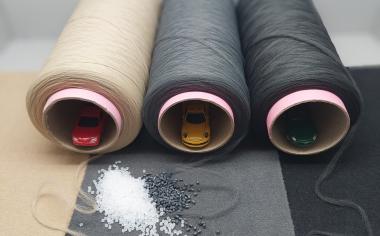B.I.G. Yarns: Virgin polyester BCF yarns for automotive carpet
To expand its support for high-end and luxurious automotive interiors, B.I.G. Yarns has completed its first industrial production runs of virgin polyester BCF yarns for automotive carpet to complement its line of polyamide PA6 superior yarns.
There is a growing market in PET for automotive interior applications, with polyester allowing automotive OEMs and Tier 1 to develop products that, from the outset, consider eco-design by building MONO-polymer carpets and flooring that are 100% recyclable at End of Life (EOL ). These materials are helping to ensure improved and more sustainable EOL recycling of electric vehicles that are driving the future of the car industry.
The new PET BCF Yarns offer high-performance for automotive carpets, including abrasion and stain resistance, and durability, passing all stringent automotive tests including the Taber test for abrasion performance, compressibility and recovery ability test, light fastness in automotive (DIN EN ISO 105-B06) and VOC (fogging) according the VDA 278 test on VOC and FOG emission. The yarns can be color solution dyed, have a dTex between 1300 – 1500, 81 filaments and are ideally for mats with a composition of 400 to 800 gram per m², while the yarns for molded carpets have a dTex of 1200, 144 filaments for 380 gram per m².
With the addition of PET BCF yarns, B.I.G. Yarns is now a one-stop-shop for 3 types of Solution Dyed BCF carpet yarns for the automotive industry: nylon (PA6), polypropylene (PP) and polyester (PET), and the Eqo-range of PA6 yarns – the sustainability focused EqoBalance, EqoCycle and EqoYarn.
The automotive carpet market is expected to grow strongly in the coming decade with the increased demand for vehicle customization and personalization driven by owners looking to upgrade and enhance interiors, including the flooring area.
A growing awareness around car hygiene is also boosting the market as consumers become more conscious of maintaining cleanliness in their vehicles, including the floors. Automotive carpets provide an effective solution by trapping dirt and preventing it from spreading to other areas.
Beaulieu International Group








